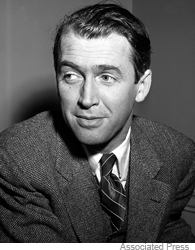Whether playing a sardonic journalist, earnest politician, recalcitrant cowboy or a man at his wit’s end, Jimmy Stewart stuttered and shuffled his way into filmgoers’ hearts. His integrity and wry humor, evident in the roles he played and in his real-life demeanor, had the effect of reassuring us that we can, indeed, live a wonderful life.
Jimmy Stewart’s Early Days
James Maitland Stewart was born May 20, 1908, in Indiana, Pennsylvania, the oldest of Alexander and Elizabeth Jackson Stewart’s three children. Young James played the accordion, was in glee club and choir, and played on the football and track teams. He also enjoyed mechanical drawing and assembling model airplanes, and went on to graduate from Princeton University with a degree in architecture in 1932.
With the Great Depression underway, finding work was difficult, so he accepted a job playing accordion with a summer stock group on Cape Cod. There he met Henry Fonda and soon landed on Broadway in a tiny part that nevertheless garnered him accolades in The New Yorker.
Sources in this Story
- The Jimmy Stewart Museum: James Maitland Stewart A Biography
- Turner Classic Movies: James Stewart Profile
- The New York Times: James Stewart, the Hesitant Hero, Dies at 89
Stewart’s Notable Accomplishments
Stewart’s early film career included performances in “You Can’t Take It With You” and “Mr. Smith Goes to Washington.” He was in Hollywood only a scant five years before earning an Academy Award for his role in “The Philadelphia Story” opposite Katharine Hepburn and Cary Grant in 1940. His Oscar stood in the window of his father’s hardware store for 25 years.
Stewart put his budding career on hold in 1941 after he was drafted into the Armed Forces. He was initially rejected for failing to meet the minimum weight requirements, but he spent several months putting on weight and was able to pass the physical. A licensed pilot, he enlisted in the Army Air Corps and went on to fly in 20 bombing missions over Germany.
He earned a host of medals, including the Distinguished Service Medal, the Flying Cross and the French Croix de Guerre. He remained in the U.S. Air Force Reserves and achieved the rank of brigadier general in 1959. In 1985, he was decorated with the Presidential Medal of Freedom.
Stewart returned to film after the war. He made more than 80 films in his career, many of them screen classics such as “Rear Window,” “It’s a Wonderful Life,” and “Vertigo,” working with Hollywood’s great directors, including Frank Capra, Alfred Hitchcock and Billy Wilder.
Stewart had a reputation as a ladies man in his early days in Hollywood, but after the war he met and married Gloria McLean in 1949. He adopted her two sons from a previous marriage and the couple soon added twin daughters of their own.
The Man and His Work
- Jimmy Stewart: A Biography by Marc Eliot
- James Stewart – The Western Collection (DVD)
- James Stewart – The Signature Collection (DVD)
The Rest of the Story
The everyman of film was also known for his simple, homespun poetry, most notably a poem about the family dog that he read on “The Tonight Show” bringing Johnny Carson to tears.
Jimmy Stewart died at his Beverly Hills home on July 2, 1997, but it is unlikely that he will be forgotten anytime soon; his obituary in The New York Times read, “He was the last of that rare breed of male stars whose careers certified the star system as it operated virtually from the beginning of the sound era.”











